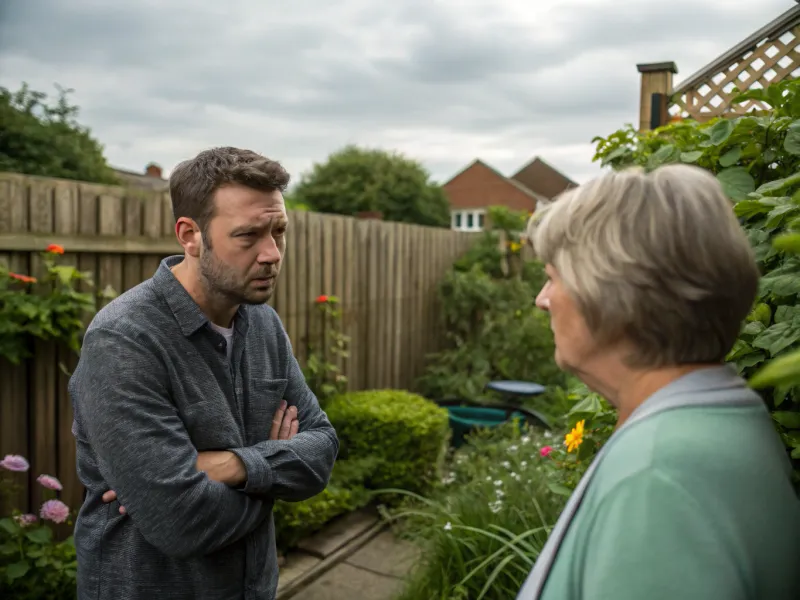Parent-child relationships are such a trip, aren’t they? They change so much over time, but let’s be real—no matter how old we get, that bond is still one of the most important in our lives. As grown-ups, we’re out there doing our thing, but we still care deeply about our parents. The tricky part?
Sometimes, without even meaning to, we hurt them in ways we don’t realize. And it’s not usually the big stuff—it’s those little words or actions that sneak in and hit harder than we’d expect.
So today, we’ll chat about 28 ways we might accidentally be causing them pain, plus how we can smooth things over and build even better connections. Let’s get into it—this is going to be equal parts heartfelt and eye-opening.
1. Not Returning Calls
Ever find yourself dodging calls from your parents because you’re too busy? Trust me, we’ve all been there. I mean, life gets hectic, right? But, when you don’t return their calls, it can make them feel neglected. They might worry something happened to you, or worse, feel like they’re no longer a priority in your life. It’s essential to understand that communication is a two-way street. Your parents just want to stay connected with you, to know how you’re doing.
Imagine if roles were reversed, and they didn’t call you back. You’d be climbing the walls with worry! So, maybe next time, just send a quick text if you can’t talk. It reassures them more than you know. Plus, you can catch up on all the family gossip later!
Remember, it’s the little things like prompt communication that keep the relationship healthy and strong. Your parents deserve to hear your voice, just as you deserve to hear theirs. It’s all about maintaining that loving connection that’s so crucial in our busy lives.
2. Canceling Plans Last Minute
Picture this: your parents have spent all week looking forward to dinner with you. They’ve set the table, cooked your favorite meal, and then, bam! You cancel last minute. It’s not just about missing dinner. To them, it feels like a broken promise. They might not say it out loud, but it stings. They’re left wondering why they don’t seem important enough for your time.
Sure, life throws curveballs, and plans change. But frequent last-minute cancellations? That can be tough for them to swallow. The disappointment accumulates, leading to feelings of sadness or even resentment.
Next time, try giving as much notice as possible if you have to change plans. Perhaps suggest a new date immediately, showing them they still matter to you. It’s all about balance. They understand life is busy, but they cherish the moments with you. After all, time spent with family is precious, isn’t it?
3. Not Asking for Advice
You might think you’ve got everything under control, but to your parents, not asking for their advice can feel like you’re shutting them out. They’ve got a lifetime of wisdom ready to share, and not involving them in your decisions can hurt. It’s almost like saying, “I don’t need you anymore,” which is far from the truth.
Parents love to feel needed, even when you’re all grown up. Seeking their advice doesn’t mean you have to follow it, but it shows you value their opinion. It’s a simple way to include them in your life and make them feel appreciated.
Next time you’re facing a decision, big or small, why not casually ask for their thoughts? You might be surprised at the insights they offer, and it’ll make them feel cherished. It’s a win-win situation, fostering closeness and understanding in your relationship.
4. Ignoring Traditions
Traditions are like the glue that holds family memories together. Ignoring or dismissing these traditions can unintentionally hurt your parents. Imagine skipping the annual family holiday gathering or not partaking in a cherished custom. To them, it can feel like you’re erasing a part of the family’s history.
Your parents might not say it, but such actions can leave them feeling disconnected. Traditions are often seen as a sign of respect for what’s been passed down through generations. When they’re ignored, it can signal a lack of appreciation for the family’s collective experiences.
It doesn’t mean you have to follow every tradition to the letter. Sometimes a compromise is all that’s needed. Try enjoying these moments, or suggest new ways to celebrate that blend old and new. It shows willingness to honor the past while welcoming the future.
5. Being Too Busy
We’re all busy, but sometimes being too busy can unintentionally hurt your parents. When you constantly prioritize work, friends, or other interests over spending time with them, it can make them feel undervalued. It’s like saying, “I don’t have time for you,” even if that’s not your intention.
Your parents likely understand you have a full life, but they want to be a part of it too. It’s about finding a balance that allows you to nurture that vital parent-child connection. Even a short call or visit can mean the world to them.
Try prioritizing your parents sometimes. Schedule regular catch-ups or set aside specific days for family time. It doesn’t have to be elaborate; even a simple coffee date can strengthen your bond. It’s all about making them feel important and loved, as they very much deserve.
6. Showing Disinterest in Their Stories
We all have those moments when our parents start telling a story, and we’ve heard it a million times. It’s easy to tune them out, but showing disinterest can deeply hurt them. To your parents, these stories are precious memories. When you seem uninterested, it’s like saying their experiences don’t matter.
Listening is one of the simplest yet most profound ways to show you care. When they reminisce, it’s not just about the story—it’s about connecting with you, sharing a piece of their life.
Next time, try to engage actively. Ask questions or react to their tales. It doesn’t just make them feel valued, it enriches your understanding of who they are. Their stories are part of your heritage, a tapestry of life experiences that have shaped your family’s journey.
7. Criticizing Their Choices
Criticism can sting, especially when it comes from someone you love. As adults, we sometimes forget that our parents are human too, with their own set of beliefs and choices. Criticizing their decisions, whether about their lifestyle or financial choices, can be hurtful.
Your parents have navigated life with the best decisions they could make at the time. When you criticize, it can feel like you’re questioning their ability to lead a fulfilled life.
Instead of criticizing, try understanding where they’re coming from. Have open conversations that allow you both to learn from each other. Remember, it’s about accepting them for who they are now, and appreciating the journey they’ve been on.
8. Comparing Them to Others
No one likes being compared to others, and parents are no exception. Whether it’s about technology skills or lifestyle choices, implying they’re falling short compared to others can be painful. It’s like saying they’re not good enough, which can affect their self-esteem.
Your parents have their unique strengths and ways of doing things. Comparing them to others can overshadow these qualities, making them feel inadequate. They’ve spent years shaping their identity; it’s crucial to honor that.
Try to focus on what makes them special. Highlight their strengths and celebrate their individuality. This positive reinforcement strengthens their confidence and shows that you value them for who they truly are.
9. Not Being Present During Visits
Imagine visiting your parents but spending more time on your phone than with them. It’s like being physically present but emotionally distant, and it can be incredibly hurtful. When you’re distracted, it sends a message that they’re not worthy of your full attention.
Your visits mean a lot to your parents. It’s their time to connect with you, share stories, and create lasting memories. When you’re not fully engaged, it’s a missed opportunity for bonding.
Next time, try to be more mindful. Put away the distractions and focus on being present. They’ll appreciate the effort, and you’ll likely find the experience more rewarding too. It’s a simple way to show them they’re loved and valued.
10. Forgetting Special Occasions
We all have busy lives, but forgetting special occasions like birthdays or anniversaries can deeply hurt your parents. These days hold significant emotional value, and forgetting them can feel like they’re not important to you.
To your parents, these occasions are not just dates; they’re celebrations of life, love, and shared memories. Forgetting them might unintentionally imply that you’ve moved on from these cherished family moments.
Making an effort to remember and celebrate these days shows how much you value your parents. Set reminders or mark your calendar to make sure you’re there to celebrate with them, either in person or with a thoughtful call or message. It’s a small gesture that carries a big emotional weight.
11. Not Introducing Them to Friends
When you hold back from introducing your parents to your friends, it can make them feel excluded. It’s like keeping them separate from a significant part of your life, which may inadvertently hurt their feelings. Your parents want to know the people who are important to you, to see the world you inhabit beyond their relationship with you.
It might seem like no big deal at first, but to them, it signifies a barrier. They might feel like they’re not good enough to meet your friends or worry that you’re embarrassed by them.
Bridging this gap by introducing them to your social circle can be incredibly meaningful. It shows them you’re proud of who they are and want them to be a part of your life. Plus, it’s a great way to blend different aspects of your world.
12. Moving Away Without Explaining
Moving away for work or other reasons can be hard on everyone, especially your parents. But moving without a proper conversation about it? That can feel like a betrayal. To them, it’s as if you’re leaving without considering their feelings or the impact on the relationship.
Your parents might understand your decision, but the lack of communication can make them feel left out. They deserve to know the reasons and to be part of this significant life change.
Take the time to talk to them about your plans. Share your excitement and concerns, and involve them in the process. This can make the transition smoother and maintain the bond you share. It’s about keeping them in the loop and showing that they still play a vital role in your life.
13. Keeping Secrets
Secrets can be a heavy burden, especially when they’re kept from family. When you keep secrets from your parents, it can create an emotional distance that’s hard to bridge. They might sense something is off and worry about what you’re hiding.
Parents often have an intuitive sense when something’s not right. Keeping them in the dark can lead to misunderstandings and strained relationships. They want to be there for you, to support and help in any way they can.
Consider opening up to them. Share your struggles or joys, even if they seem trivial. This transparency can strengthen your bond and lead to a more open and trusting relationship. After all, family is about supporting each other through thick and thin.
14. Underestimating Their Tech Skills
We often assume our parents are out of touch with technology, but underestimating their tech skills can be dismissive. It’s like putting them in a box labeled “outdated,” which can be hurtful. They might feel belittled or frustrated by these assumptions.
Your parents are more adaptable than you might think. They’ve seen the world evolve and have learned to adapt in many ways. Technology is just another frontier they’re willing to explore.
Encourage them by showing patience and providing help when needed. Celebrate their successes, no matter how small. It’s about fostering confidence and showing them that they’re capable and valued, even in a rapidly changing world.
15. Not Showing Appreciation
Appreciation goes a long way, especially with your parents. Sometimes, we get so caught up in our lives that we forget to show gratitude for all they do. Not expressing appreciation can make them feel taken for granted, as if their efforts go unnoticed.
Your parents have likely spent years supporting and nurturing you. A simple thank you or acknowledgment of their contributions can mean the world to them. It reassures them that their love and efforts are valued.
Make it a habit to express your appreciation, whether through words, gestures, or actions. It strengthens your relationship and reinforces the love that forms the foundation of your family.
16. Holding Onto Grudges
Grudges can be toxic, especially within families. Holding onto past hurts can create an emotional rift that’s hard to mend. By not letting go, you might unintentionally hurt your parents, making them feel perpetually judged or inadequate.
Your parents might not even realize what’s wrong, leading to confusion and sadness. Holding onto grudges can prevent healing and growth within your relationship.
Consider talking openly about past grievances, seeking understanding and resolution. It’s about moving forward together, forgiving, and building a stronger bond. Life is too short to hold onto negativity, especially with those you love.
17. Judging Their Lifestyle
Judgment can be harsh, especially when it comes from family. Judging your parents’ lifestyle choices can make them feel ashamed or misunderstood. Whether it’s their hobbies, habits, or routines, criticism can sting.
Your parents have their reasons for the way they live, shaped by years of experiences and preferences. When you judge, it’s like dismissing their individuality and the choices they’ve made to live happily.
Try accepting their uniqueness instead of judging. Celebrate their quirks and learn from their experiences. It’s about accepting them for who they are and respecting their right to live as they choose.
18. Being Financially Dependent
Financial dependence can be a tricky subject. Constantly relying on your parents for financial support can put a strain on them, both emotionally and financially. It might make them feel as though you’re not standing on your own two feet or appreciating their sacrifices.
Your parents likely want nothing more than to see you succeed and be independent. Continual dependence can make them worry about your future and their ability to support you long-term.
Consider ways to become more financially independent. It’s not just about lifting the burden from your parents; it’s about growing into your own person. Financial independence can lead to a more respectful and mature relationship with them.
19. Not Valuing Their Opinions
When you dismiss your parents’ opinions, it can feel like you’re not valuing their wisdom. They’ve lived through decades of experiences and have insights that could be beneficial. Ignoring their advice can make them feel undervalued and disconnected from your life.
Your parents want to share in your journey, offering guidance and support. By not valuing their opinions, you might be missing valuable lessons they’ve learned along the way.
Consider listening with an open mind. You don’t have to agree with everything, but showing respect and consideration for their views can strengthen your bond. It’s about mutual respect and learning from each other’s perspectives.
20. Taking Over Their Decisions
Taking over decisions for your parents, even with good intentions, can feel like you’re stripping away their independence. It’s like saying, “I know better,” which can hurt their pride and autonomy.
Your parents have spent a lifetime making their own choices. Suddenly taking over can feel disempowering, as if they’re no longer capable of managing their affairs. They might feel sidelined or overlooked.
Instead, try involving them in decisions. Collaborate and respect their input. It’s about empowering them and honoring their ability to contribute to their own lives. This approach can help maintain their dignity and strengthen your relationship.
21. Not Respecting Boundaries
Boundaries are vital in any relationship, even with family. Not respecting your parents’ boundaries can make them feel disrespected or invaded. It’s like saying their privacy doesn’t matter, which can be hurtful.
Your parents are individuals with their own needs for space and autonomy. Disregarding boundaries can lead to tension and misunderstandings.
Consider discussing and establishing mutual boundaries. It’s about understanding and respecting each other’s space and comfort levels. This mutual respect can lead to a healthier and more harmonious relationship.
22. Mocking Their Fashion Choices
Fashion is a personal expression, and mocking your parents’ choices can hurt more than you think. It’s like saying they’re out of touch, which can affect their self-esteem. Your parents’ styladult children hurt parentse reflects their personality and history; belittling it can feel dismissive.
They’ve lived through various fashion eras, each holding sentimental value. Mocking their choices can imply that their past and identity don’t matter.
Accept their style and celebrate the uniqueness it brings to your family’s story. It’s about appreciating the individual expression that makes them who they are. Compliment their style and invite them to share the stories behind their fashion evolution.
23. Avoiding Difficult Conversations
Avoiding difficult conversations can create a rift in your relationship with your parents. You might think you’re sparing them distress, but it can lead to confusion and unresolved issues. Not addressing these conversations head-on can make them feel ignored or misunderstood.
Your parents likely value honesty and openness, even when the topics are tough. Avoidance only postpones the inevitable, leading to prolonged tension.
Consider approaching these conversations with empathy and patience. It’s about working through challenges together, fostering a deeper understanding and connection. Through difficult discussions, you can strengthen your bond and grow closer as a family.
24. Distancing Yourself Emotionally
Emotional distance can be as painful as physical distance. When you distance yourself emotionally from your parents, it can make them feel isolated and unloved. They might not understand why you’re pulling away, leading to feelings of rejection.
Your parents want to share in your emotional journey, to be there for the highs and lows. When you close off, it’s like building a wall that prevents intimacy and connection.
Try opening up more about your feelings and experiences. It doesn’t have to be a grand gesture; small steps towards emotional sharing can bridge the gap. It’s about letting them in and fostering a stronger, more compassionate bond.
25. Making Life-Changing Decisions Alone
Big decisions often impact more than just ourselves. When you make life-changing choices without consulting your parents, it can feel like you’re sidelining them. It’s as if their opinions don’t matter, which can be deeply hurtful.
Your parents have been there for all your major milestones. Excluding them from significant decisions can make them feel undervalued and disconnected. They want to be part of your journey, sharing in the triumphs and challenges.
Consider involving them in the decision-making process. Seek their advice or simply share your plans. It’s about maintaining a sense of family unity and showing that their role in your life is still cherished and respected.
26. Treating Them Like Children
As roles shift with age, it’s easy to fall into the trap of treating your parents like children. This can be incredibly disrespectful and hurtful, as it undermines their maturity and wisdom. It’s like saying, “I know better,” which can be demeaning.
Your parents have weathered life’s storms, gaining knowledge and strength along the way. Treating them like children can strip away their dignity and make them feel insignificant.
Approach them with respect and acknowledge their life experience. It’s about maintaining a balanced relationship where both parties feel valued and heard. After all, they’re still your parents, deserving of respect and admiration.
27. Not Respecting Their Experience
Experience is a valuable teacher. When you disregard your parents’ experiences, it can feel like their life lessons don’t matter. It’s as if you’re saying their journey lacks relevance, which can be hurtful.
Your parents have faced countless challenges and have learned from each. Dismissing their experiences overlooks the wisdom they offer. They want to share these insights, hoping to guide and support you.
Consider valuing their experiences as a source of wisdom. Listen actively and be open to learning from their past. It’s about mutual respect and understanding, fostering a relationship where knowledge is shared and appreciated.
28. Being Impatient with Aging
Aging is a natural process, but being impatient with your parents as they age can be hurtful. It’s like saying, “You’re an inconvenience,” which can deeply impact their self-esteem and emotional well-being.
Your parents are likely aware of their changing abilities. Showing impatience can make them feel like a burden, leading to feelings of guilt or sadness.
Practice patience and empathy. Understand that aging comes with its challenges, and your support can make a world of difference. It’s about appreciating their presence and valuing their contribution to your life, even as roles evolve.





























